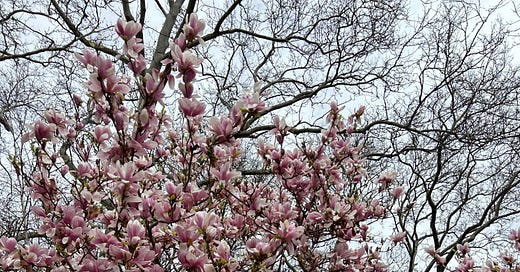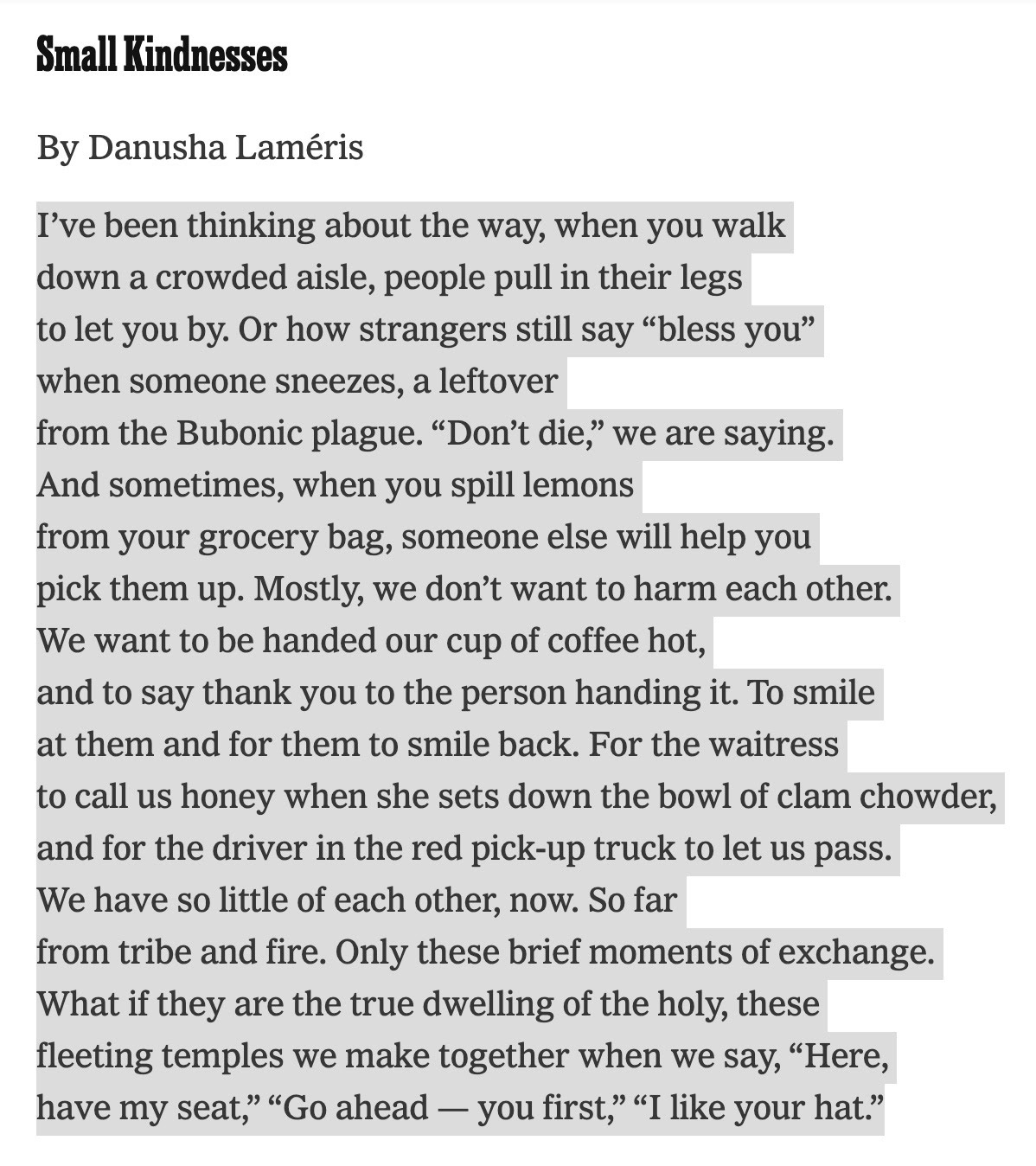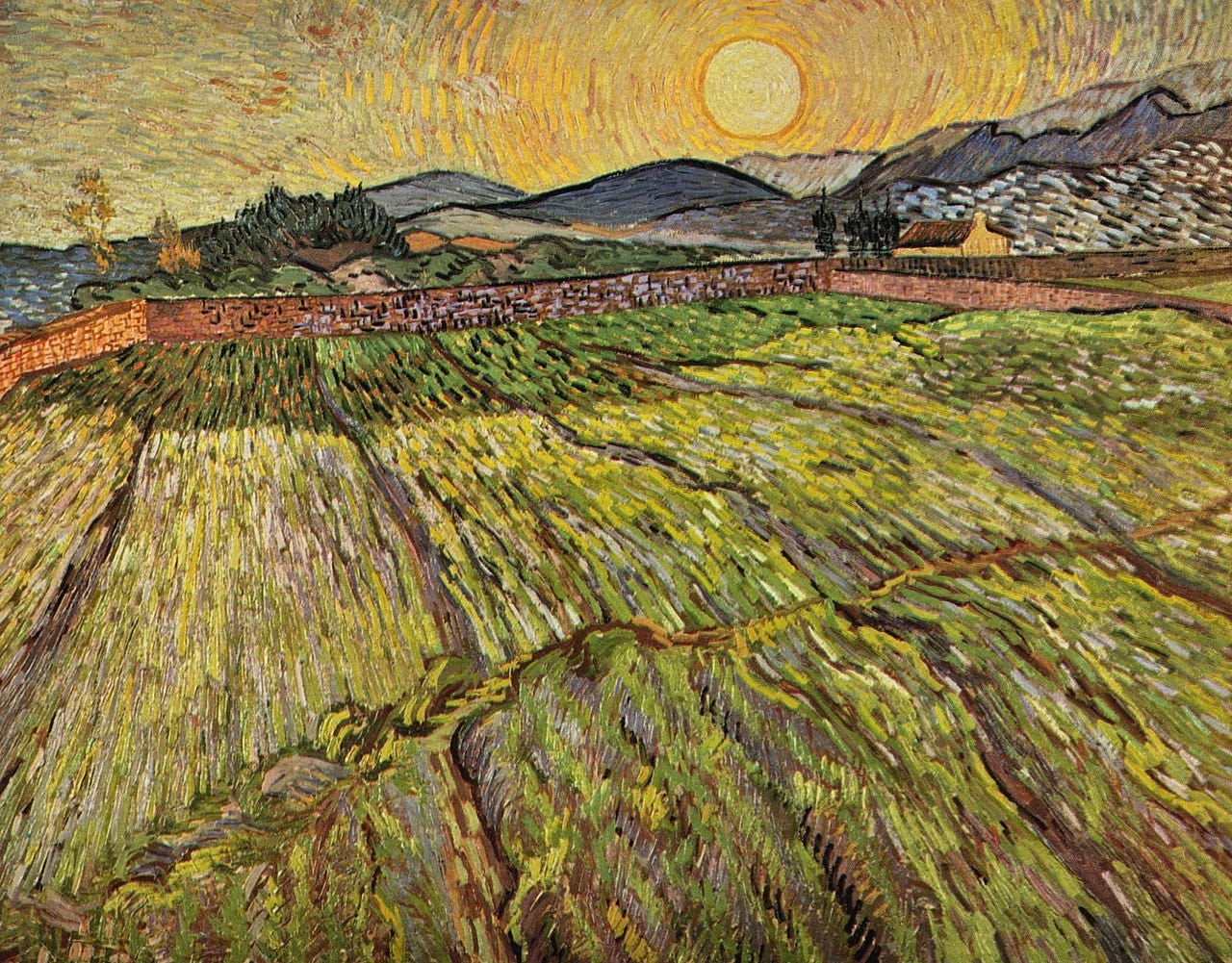Hi friends,
The best things in life tend to find us — they fall into our lap by circumstance. Unforeseen gifts put a pep in our step, don’t they? Serendipity is one of life’s treasures, whether it’s an unexpected blessing, a surprising act of kindness, or a professional or artistic breakthrough. Great things often ensue.
The essayist Maria Popova wrote, “The best things in life we don’t choose — they choose us. A great love, a great calling, a great illumination — they happen unto us, like light falling upon that which is lit.” Not only is that a beautiful collection of words, but it gets you thinking about all the ways in which great things have chosen you. When you think back on your life, what has chosen you? A love, a calling, an idea?
When I met my fiancé, Ally, six years ago, I wasn’t necessarily looking for love or a long-term partner. Our relationship was born, mostly, by happenstance as we worked at the same college newspaper, pursuing an activity we adored. Many relationships form from this sort of chance and serendipity. Perhaps how-you-met stories are the best example of great things choosing us.
For success, like happiness, cannot be pursued; it must ensue. And it only does so as the unintended side effect of one's personal dedication to a cause greater than oneself or as the by-product of one's surrender to a person other than oneself. — Victor Frankl
Writing and reading are the activities that have become both my hobbies and career. But I wouldn’t say I chose them. There was an inner force that guided me to them from a young age, sometime around fourth grade, when all I wanted to do during our “free” period after lunch was write stories about people and the world. In The Daily Laws, Robert Greene writes about the deep value of your childhood interests. Those are powerful indicators of what you love, and what has “chosen you.” Getting reacquainted with those early passions — the things you’ve always felt a pull toward — is a healthy way to find your calling, rather than just a career.
Chances are, there’s something you were drawn to as a child, something that chose you. What is it? What’s something you’ve always felt a pull toward? Reconnecting with those impulses is a powerful signal of your calling and love. It’s another way of saying: What things have chosen you?
Love,
Matthew
Thwart Hedonic Adaptation (H/T: Grateful Living)
Gratitude helps us thwart hedonic adaptation. If you recall, hedonic adaptation is illustrated by our remarkable capacity to adjust to any new circumstance or event. This is extremely adaptive when the new event is unpleasant, but not when a new event is positive. So, when you gain something good in your life — a romantic partner, a genial officemate, recovery from illness, a brand-new car — there is an immediate boost in happiness and contentment. Unfortunately, because of hedonic adaptation, that boost is usually short-lived. As I’ve argued earlier, adaptation to all things positive is essentially the enemy of happiness, and one of the keys to becoming happier lies in combating its effects, which gratitude does quite nicely. By preventing people from taking the good things in their lives for granted — from adapting to their positive life circumstances — the practice of gratitude can directly counteract the effects of hedonic adaptation.
From 2019 in NYT:
No photo of the week this time, just this sunrise — Enclosed Field with Rising Sun by Vincent van Gogh (1889). As spring unfolds into summer, one of my goals is to see more sunrises on the beach, in the meadows, and from various areas of the parks. Sunrises symbolize renewal and fresh starts.
A quote to meditate on:
"Do not ask your children to strive for extraordinary lives. Such striving may seem admirable, but it is the way of foolishness. Help them instead to find the wonder and the marvel of an ordinary life. Show them the joy of tasting tomatoes, apples and pears. Show them how to cry when pets and people die. Show them the infinite pleasure in the touch of a hand. And make the ordinary come alive for them. The extraordinary will take care of itself."
― William Martin, The Parent's Tao Te Ching
For
I wrote about the role parks play in climate-resilient cities. “Never doubt that a small group of people have the ability to change the world. It’s the only thing that ever has. Margaret Mead said that.”Parting questions: What do you want to celebrate today? This week? This month?
Celebrate your gifts,
Matthew
P.S. — Thank you for reading and trusting me with these words, a privilege I don’t take lightly. If Inner Peace has helped you in some way, please consider forwarding this email to someone you care about.






I love the way you’ve opened this blog post. I identified with most of what you’ve wrote. Thank you for sharing! 👍
the practice of gratitude can directly counteract the effects of hedonic adaptation.
This reminder is really valuable. Fresh new eyes, fresh new feeling.